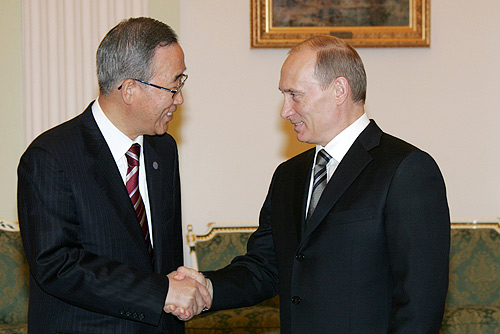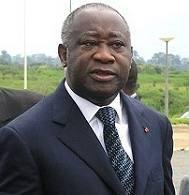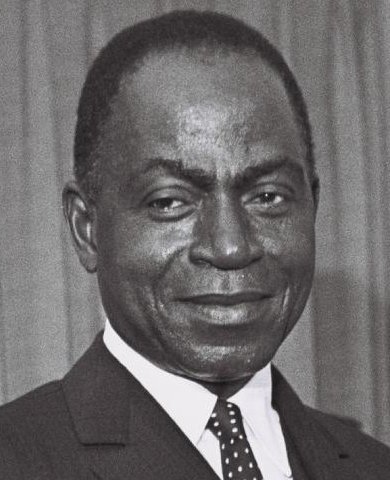|
United Nations Security Council Resolution 1911
United Nations Security Council Resolution 1911, adopted unanimously on January 28, 2010, after reaffirming resolutions 1880 (2009) and 1893 (2009), and reiterating its determination to bring about a credible election process in Côte d'Ivoire, the Council approved a four-month extension of the United Nations Operation in Côte d'Ivoire (UNOCI) until the end of May 2010, and a temporary increase in the size of the operation from 7,450 to 7,950 personnel. The Council also allowed a temporary increase and extension of French peacekeeping forces in the country, including peacekeepers from nearby Burkina Faso to be added to the UNOCI to improve security before the 2010 election process. The resolution also requested the Secretary-General Ban Ki-moon to report back on the situation in the form of an update in mid-March 2010 and a full report by April 2010. See also * Ivorian Civil War * Ivorian parliamentary election, 2010 * Ivorian presidential election, 2010 * List of United Nat ... [...More Info...] [...Related Items...] OR: [Wikipedia] [Google] [Baidu] |
United Nations
The United Nations (UN) is an intergovernmental organization whose stated purposes are to maintain international peace and international security, security, develop friendly relations among nations, achieve international cooperation, and be a centre for harmonizing the actions of nations. It is the world's largest and most familiar international organization. The UN is headquarters of the United Nations, headquartered on extraterritoriality, international territory in New York City, and has other main offices in United Nations Office at Geneva, Geneva, United Nations Office at Nairobi, Nairobi, United Nations Office at Vienna, Vienna, and Peace Palace, The Hague (home to the International Court of Justice). The UN was established after World War II with Dumbarton Oaks Conference, the aim of preventing future world wars, succeeding the League of Nations, which was characterized as ineffective. On 25 April 1945, 50 governments met in San Francisco for United Nations Conference ... [...More Info...] [...Related Items...] OR: [Wikipedia] [Google] [Baidu] |
Ban Ki-moon
Ban Ki-moon (; ; born 13 June 1944) is a South Korean politician and diplomat who served as the eighth secretary-general of the United Nations between 2007 and 2016. Prior to his appointment as secretary-general, Ban was his country's Minister of Foreign Affairs and Trade between 2004 and 2006. Ban was the foreign minister of South Korea between 2004 and 2006. Ban was initially considered to be a long shot for the office of Secretary-General of the United Nations however, he began to campaign for the office in February 2006. As the foreign minister of South Korea, he was able to travel to all the countries on the United Nations Security Council, a maneuver that subsequently turned him into the campaign's front runner. On 13 October 2006, he was elected as the eighth secretary-general by the United Nations General Assembly. On 1 January 2007, he succeeded Kofi Annan. As secretary-general, he was responsible for several major reforms on peacekeeping and UN employment practice ... [...More Info...] [...Related Items...] OR: [Wikipedia] [Google] [Baidu] |
2010 In Ivory Coast
The following lists events that happened during 2010 in Ivory Coast. Incumbents *President: ** Laurent Gbagbo ** Alassane Ouattara (from December 4) *Prime Minister: ** Guillaume Soro ** Gilbert Aké (from December 6) Events October * October 31 - Voters in Ivory Coast go to the polls for the long delayed presidential election. November * November 6 - The Ivory Coast presidential election will go to a second round with President Laurent Gbagbo facing opposition leader Alassane Ouattara. * November 10 - Ivory Coast defers the second round of voting for the Ivory presidential election to November 28. * November 27 - Second Ivorian Civil War ** At least three people die in protests in Ivory Coast over a curfew imposed ahead of the second round of the Ivorian presidential election. ** Laurent Gbagbo declares a curfew, amid clashes that killed three people ahead of the second round of the presidential election on Sunday. * November 28 - Voters in Ivory Coast go to the polls for ... [...More Info...] [...Related Items...] OR: [Wikipedia] [Google] [Baidu] |
2010 United Nations Security Council Resolutions
1 (one, unit, unity) is a number representing a single or the only entity. 1 is also a numerical digit and represents a single unit of counting or measurement. For example, a line segment of ''unit length'' is a line segment of length 1. In conventions of sign where zero is considered neither positive nor negative, 1 is the first and smallest positive integer. It is also sometimes considered the first of the infinite sequence of natural numbers, followed by 2, although by other definitions 1 is the second natural number, following 0. The fundamental mathematical property of 1 is to be a multiplicative identity, meaning that any number multiplied by 1 equals the same number. Most if not all properties of 1 can be deduced from this. In advanced mathematics, a multiplicative identity is often denoted 1, even if it is not a number. 1 is by convention not considered a prime number; this was not universally accepted until the mid-20th century. Additionally, 1 is ... [...More Info...] [...Related Items...] OR: [Wikipedia] [Google] [Baidu] |
List Of United Nations Security Council Resolutions 1901 To 2000
This is a list of United Nations Security Council Resolutions 1901 to 2000 adopted between 16 December 2009 and 27 July 2011. See also * Lists of United Nations Security Council resolutions * List of United Nations Security Council Resolutions 1801 to 1900 * List of United Nations Security Council Resolutions 2001 to 2100 This is a list of United Nations Security Council Resolutions 2001 to 2100 adopted between 28 July 2011 and 25 April 2013. See also * Lists of United Nations Security Council resolutions * List of United Nations Security Council Resolutions ... {{United Nations *1901 ... [...More Info...] [...Related Items...] OR: [Wikipedia] [Google] [Baidu] |
Ivorian Presidential Election, 2010
Presidential elections were held in Ivory Coast in 2010. The first round was held on 31 October, and a second round, in which President Laurent Gbagbo faced opposition leader Alassane Ouattara, was held on 28 November 2010. Originally scheduled to be held in 2005, the vote was delayed several times due to the Ivorian Civil War and difficulties involved in the organization and preparation of the elections. A peace agreement between the government and the former rebel New Forces was signed on 4 March 2007,"Ivorian president vows to hold elections as scheduled" Xinhua (''People's Daily''), 10 July 2007. and in late April 2009, it was announced that the elections would be held by 6 December 2009, and that the date would be announced shortly. On 15 May 2009, the date was announced to be 29 N ... [...More Info...] [...Related Items...] OR: [Wikipedia] [Google] [Baidu] |
Ivorian Parliamentary Election, 2010
Parliamentary elections were held in Ivory Coast on 11 December 2011, after the presidential elections in late 2010. They followed a peace agreement between the government and the New Forces (former rebels) that was signed in March 2007."Ivorian president vows to hold elections as scheduled" Xinhua (''People's Daily Online''), July 10, 2007. The Rally of the Republicans, the party of President Alassane Ouattara, won just under half the seats in the Nationa ... [...More Info...] [...Related Items...] OR: [Wikipedia] [Google] [Baidu] |
First Ivorian Civil War
The First Ivorian Civil War was a civil conflict in the Ivory Coast (also known as Côte d'Ivoire) that began with a military rebellion on 19 September 2002 and ended with a peace agreement on 4 March 2007. The conflict pitted the government of Ivorian President Laurent Gbagbo against a domestic insurgency led by the New Forces of Ivory Coast (''Forces nouvelles de Côte d'Ivoire''). The war was preceded by a tumultuous decade in Ivory Coast, marked by an economic downturn and, following the death of long-time Ivorian President Félix Houphouët-Boigny in December 1993, a leadership succession crisis. The succession crisis manifested in a 1999 military coup d'état and a violent dispute over the result of the 2000 presidential election. Three successive Ivorian leaders – Henri Konan Bédié from 1993, Robert Guéï from 1999, and Gbagbo from 2000 – exploited the ideology of Ivoirité to repress and marginalise political opposition, notably by disqualifying Alassane Ouattar ... [...More Info...] [...Related Items...] OR: [Wikipedia] [Google] [Baidu] |
Secretary-General Of The United Nations
The secretary-general of the United Nations (UNSG or SG) is the chief administrative officer of the United Nations and head of the United Nations Secretariat, one of the six principal organs of the United Nations. The role of the secretary-general and of the secretariat is laid out by Chapter XV (Articles 97 to 101) of the United Nations Charter. However, the office's qualifications, selection process and tenure are open to interpretation; they have been established by custom. Selection and term of office The secretary-general is appointed by the General Assembly upon the recommendation of the Security Council. As the recommendation must come from the Security Council, any of the five permanent members of the council can veto a nomination. Most secretaries-general are compromise candidates from middle powers and have little prior fame. Unofficial qualifications for the job have been set by precedent in previous selections. The appointee may not be a citizen o ... [...More Info...] [...Related Items...] OR: [Wikipedia] [Google] [Baidu] |
United Nations Security Council Resolution
A United Nations Security Council resolution is a United Nations resolution adopted by the fifteen members of the Security Council (UNSC); the United Nations (UN) body charged with "primary responsibility for the maintenance of international peace and security". The UN Charter specifies (in Article 27) that a draft resolution on non-procedural matters is adopted if nine or more of the fifteen Council members vote for the resolution, and if it is not vetoed by any of the five permanent members. Draft resolutions on "procedural matters" can be adopted on the basis of an affirmative vote by any nine Council members. The five permanent members are the People's Republic of China (which replaced the Republic of China in 1971), France, Russia (which replaced the defunct Soviet Union in 1991), the United Kingdom, and the United States. , the Security Council has passed 2662 resolutions. Terms and functions mentioned in the UN Charter The term "resolution" does not appear in the text ... [...More Info...] [...Related Items...] OR: [Wikipedia] [Google] [Baidu] |
Burkina Faso
Burkina Faso (, ; , ff, 𞤄𞤵𞤪𞤳𞤭𞤲𞤢 𞤊𞤢𞤧𞤮, italic=no) is a landlocked country in West Africa with an area of , bordered by Mali to the northwest, Niger to the northeast, Benin to the southeast, Togo and Ghana to the south, and the Ivory Coast to the southwest. It has a population of 20,321,378. Previously called Republic of Upper Volta (1958–1984), it was renamed Burkina Faso by President Thomas Sankara. Its citizens are known as ''Burkinabè'' ( ), and its capital and largest city is Ouagadougou. The largest ethnic group in Burkina Faso is the Mossi people, who settled the area in the 11th and 13th centuries. They established powerful kingdoms such as the Ouagadougou, Tenkodogo, and Yatenga. In 1896, it was colonized by the French as part of French West Africa; in 1958, Upper Volta became a self-governing colony within the French Community. In 1960, it gained full independence with Maurice Yaméogo as president. Throughout the decades post in ... [...More Info...] [...Related Items...] OR: [Wikipedia] [Google] [Baidu] |
France
France (), officially the French Republic ( ), is a country primarily located in Western Europe. It also comprises of Overseas France, overseas regions and territories in the Americas and the Atlantic Ocean, Atlantic, Pacific Ocean, Pacific and Indian Oceans. Its Metropolitan France, metropolitan area extends from the Rhine to the Atlantic Ocean and from the Mediterranean Sea to the English Channel and the North Sea; overseas territories include French Guiana in South America, Saint Pierre and Miquelon in the North Atlantic, the French West Indies, and many islands in Oceania and the Indian Ocean. Due to its several coastal territories, France has the largest exclusive economic zone in the world. France borders Belgium, Luxembourg, Germany, Switzerland, Monaco, Italy, Andorra, and Spain in continental Europe, as well as the Kingdom of the Netherlands, Netherlands, Suriname, and Brazil in the Americas via its overseas territories in French Guiana and Saint Martin (island), ... [...More Info...] [...Related Items...] OR: [Wikipedia] [Google] [Baidu] |




